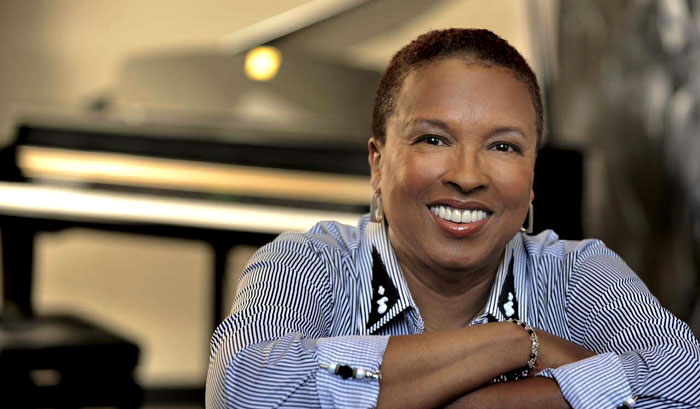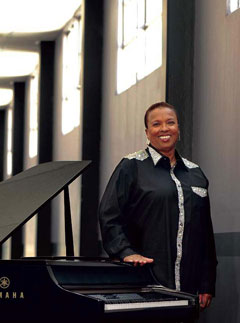


AS MUSICAL DIRECTOR, CONDUCTOR, AND KEYBOARDIST for Natalie Cole, Gail Deadrick knows you can never know too many songs. "I'll put it this way: You have to love music," she laughs. "It's not like a show where you can learn 20 songs and you're good. Right now Natalie travels with 118 songs in the book-and those hundred-odd songs can change!"
This massive repertoire becomes even more impressive when you factor in all the arrangements. "She has a symphony library, a big-band library, and her R&B library," Gail notes. "It's part of the musical director's responsibility to know each of these, and to be able to reorchestrate or reassign parts in order to pull off some of the big orchestral numbers with a smaller group."
Since 2000, Deadrick has traveled the world as Cole's musical right hand. She's conducted the Los Angeles Philharmonic and other major orchestras, appeared at international jazz festivals from Switzerland to Japan, and performed numerous times on national television. The current touring band of nine musicians and backing singers may not be a full orchestra, but Gail is adept at reconfiguring arrangements as needed to bring out the best in each song.

"We put our own little spin on it," she says. "We tweak it and make it work for her. There are certain melodic things Natalie is looking for. It doesn't matter whether a clarinet plays it or strings play it. The important thing, as a musical director, is to know what she needs to hear."
Gail comes from a musical family. Her brother, drummer/percussionist Tyrell "Rock" Deadrick, has played with such artists as Tracy Chapman and Ben Harper. Gail grew up playing piano and organ.
"I started at four, playing classical music," she recalls. "When I was nine, my parents said, 'Well, if you can play that, you can play in church.'" Deadrick's fellow churchgoers happened to include a few other musicians: Billy Preston. James Cleveland. Andraé Crouch. "I grew up being exposed to the cream of the cream of gospel greats," she says.
After three years in college studying to become an attorney, music lured Gail back. "I bought myself a little Wurlitzer and started playing clubs, and it just snowballed," she says. "Once you get on the circuit, your name is there."
As she's risen to the top of her profession, Deadrick has accompanied and/or conducted artists such as the 5th Dimension, the Pointer Sisters, Gladys Knight, Dionne Warwick, Nancy Wilson, Aaron Neville, and Roberta Flack. She first made the transition from top-tier keyboardist to conductor and musical director at the suggestion of Sonny & Cher musical director Harold Battiste: "He said, 'You know, you could do this. I want to retire!' And I said, 'Uh, okay.' I was with Marilyn McCoo and Billy Davis, Jr. at that time, and they said, 'Harold, if you think she can handle it, then okay.' They put me out there, and it just kept going."
Gail relies on her Yamaha CVP409GP Clavinova for her daily practice sessions. "I love the Clavinova-the sound is so wonderful," she says. "If I'm working on an arrangement, I can press one button to quickly record an idea while it's in my head, then transfer it to my mixer or my computer. It's really very easy."
I love the Clavinova. I can press one button to quickly record an idea, then transfer it to my mixer or my computer.
She also plays a Yamaha Motif on stage with Natalie Cole. "The other keyboard player and I are currently using XS8s, and then he uses the ES7 as an extra keyboard," she explains. "Each time Yamaha comes out with a new product, the sound quality just excels. The string sounds are the main reason we went to Yamaha-they're so lush, and Natalie was really happy."
Whether she's playing a string part on her Yamaha keyboard or conducting a 100-piece orchestra, Deadrick stays at the top of her profession via two key components: preparation and passion.
"People think when you've been playing for 40 years or so, you don't need to practice," she observes. "Nothing could be more untrue. You always need to keep learning. You always need to study. And when you stand up in front of an orchestra, you need to bring the passion with you. They need to know that you know the parts, and understand the subtle nuances that are supposed to transpire in certain songs. I smile a lot when I'm on stage with orchestras, because I'm just in awe of the beauty of the sound. Most of all, I smile."
(Photography Credit: Rob Shanahan)
























